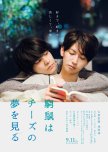
never fair, never fleshed out
Never Fair is a straightforward short-form BL drama centered on childhood friends reuniting as adults. Visually, it’s appealing, and the chemistry between the leads is definitely present. For a series of this length, it makes a strong first impression with its setup.however, where it falls short is in its character dynamics and execution. one of the leads comes off as overly controlling and possessive, and the story doesn’t provide enough time or depth to explore or justify that behavior. additionally, the first kiss happening while one character is intoxicated felt uncomfortable and poorly handled. for a relationship that’s supposed to be rooted in history and trust, the moment lacked the necessary emotional grounding.
the love triangle subplot also didn’t land—there was very little chemistry between the characters involved, and the conflict felt forced rather than organic. while short dramas often face limitations, many recent k-bls have proven that it’s possible to deliver a tight, emotionally satisfying story in under 10 minutes per episode. this one just didn’t quite get there.
there’s clear potential in the premise, and the series isn’t without its enjoyable moments, but ultimately, it left little lasting impact. it's a decent filler watch if you're not expecting much, but sadly, pretty forgettable overall.
Was this review helpful to you?

This review may contain spoilers
love stayed longer than life allowed
eternal yesterday is not about ghosts or miracles—it's about the unbearable gentleness of holding someone who is slipping away, slowly, lovingly, and completely. it is about youth wrapped in the warmth of first love, and the cold that follows after.koichi and michan love each other with the quiet certainty only teenagers know—a kind of love untouched by shame, unafraid of truth. they fall not with fireworks, but with open palms and tender eyes. it's all so soft—until it begins to end.
koichi dies. and then he doesn't
he comes back, not fully alive, not fully gone—a miracle that feels more like a wound. he smiles, he talks, he stays. but with every passing day, the world forgets him. only michan remembers. only michan holds on.
and what is grief if not the act of remembering when no one else will?
there is something devastating in their devotion—not in tragedy, but in kindness. koichi loves michan enough to stay. michan loves koichi enough to let him go. this is a story where love is not proven by how long you hold on, but by how gently you release what was never yours to keep.
their story isn't fair. it isn't easy. but it's full of a kind of purity that hurts—the kind that only youth and first love can create. that ache of knowing you've found something real, and still having to say goodbye.
in the end, eternal yesterday is a love poem disguised as a ghost story. a soft ache that lingers in the chest. a reminder that sometimes love, no matter how brief or broken, is still real. still worth remembering.
they were just boys. but to each other, they were everything.
Was this review helpful to you?

This review may contain spoilers
a brutally honest portrait of love, change, and emotional accountability
this isn’t the kind of BL film that wraps itself in idealized tropes or gives comfort in romance. it’s an uncomfortable, messy, and deeply human story—and for that reason, it's one of the most powerful i’ve seen.at its core is kyouichi, a man who lives a pitiful and hollow life. a womanizer and emotionally vacant, he gets married not out of love, but out of a vague sense of obligation—because it’s what society expects of him. he’s never really stopped to think about what he wants, who he is, or how his behavior affects others. he moves through life selfishly, detached, never truly caring about those who try to get close to him.
then there’s imagase, who represents everything that challenges kyouichi’s emotional stagnation. his love is obsessive, manipulative—even predatory at times—but it’s also raw, honest, and unwavering. his searing line, “you have a weakness for people who love you, but you don’t trust that love in the end, and sniff around the feelings of those who approach you,” cuts deep, not just into kyouichi’s character but into the emotional detachment that defines many modern relationships.
and yet, what makes this film resonate is not the toxicity—it’s the potential for growth. kyouichi isn’t a likable man, but he is human. and for all his flaws, he proves capable of change. he begins to accept who he is, stops running from himself, and starts taking emotional responsibility—not just for his own life, but for the people he’s hurt. that willingness to grow doesn’t come easily or quickly. it comes from being challenged by someone who, despite everything, truly loved him.
this is beautifully encapsulated in the final scene. kyouichi sits alone at the barstool—on the same stool where Imagase always waited for him. the ashtray is no longer thrown away but placed gently on the table, washed and cleaned. the curtains are white and sheer, replacing the tacky blue ones. small, quiet details, but they say everything. he’s not waiting for someone to fix him anymore. he’s doing what he can, on his own. as he puts it, “i want to wait. by myself. i want to do what i can.”
in the end, imagase's love—unconventional, obsessive, but undeniably pure—becomes the catalyst for kyouichi’s growth. and in that sense, the film suggests that to truly love someone is for them to become your only exception.
it’s not romantic. it’s not easy. but it’s real—and that’s what makes this story unforgettable.
Was this review helpful to you?













